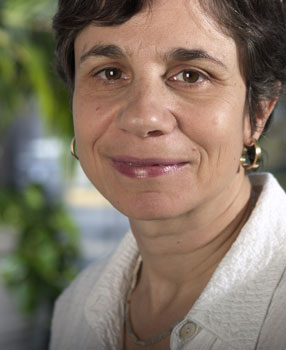SUMMER 2008 CONTENTS
Home
Good as Gold?
New drug approvals ebb; doubts over testing's gold standard grow
Q&A with Katie Couric
Standing up for cancer research
Breath of Hope
Lifeline or gamble? Sometimes a clinical trial is both
Just Another Lab Rat
The human subjects trade is booming, largely without oversight
Fixing Trial Tribulations
Solutions from Stanford
A Spoonful of Sugar Pills
Why nothing really is something, and in some ways is better than anything
Banding Together
Minds of all kinds join to hasten discoveries of new medical treatments


Zarin Q&A
Q&A with a drug trials overseer
Condensed and Edited by Rosanne Spector
Photo by RANDALL SCOTT
Deborah Zarin, director of the world’s largest registry of clinical trials, helps trials see the light of day. She runs the National Institutes of Health’s clinicaltrials.gov, which logs trials in the United States and abroad. Zarin spoke with Stanford Medicine’s Paul Costello about the need for transparency in clinical studies.
How big is the gap between the number of the studies that have been funded and the number for which results are publicly available?
Zarin: Well, it’s very hard to know, in part because there’s no good list of everything that’s been conducted. But with the help of trial registries, information posted by the FDA and data obtained through the Freedom of Information Act, we’re getting a denominator. For example, one recent paper suggests that over 30 percent of trials of 12 antidepressants submitted to the FDA, mainly those with negative results, have not been published.
So is it fair to say that a consumer’s attitude should be caveat emptor?
Zarin: The question is whether your physician or your health-care provider has the information necessary to make a good decision on your behalf or has shared the information with you so that you together can make a good decision. And I think, unfortunately, there have been many instances where it seems like important information is missing.
JAMA recently reported that the pharmaceutical giant Merck authored drug studies for academic researchers. Did this news surprise you?
Zarin: No, I think that probably didn’t surprise many people because if you look at the literature over the last several years or talk to people who are in the field, what you hear is that the marketing arms of certain drug companies can be very aggressive — as you would expect them to be once you remember that they are a commercial enterprise. They’re in it to gain market advantage and earn money. So I see that as not surprising.
How skeptical should the public be, then, when a new drug comes to the market?
Zarin: Since I’ve been in medical school, and that’s been a long time, people in clinical pharmacology have always warned of the transition from a new drug coming on the market before it’s well-worn and tested in large groups of patients. One well-known professor of clinical pharmacology used to say, “Don’t be the first to use a new drug and don’t be the last to stop using an old drug.”

